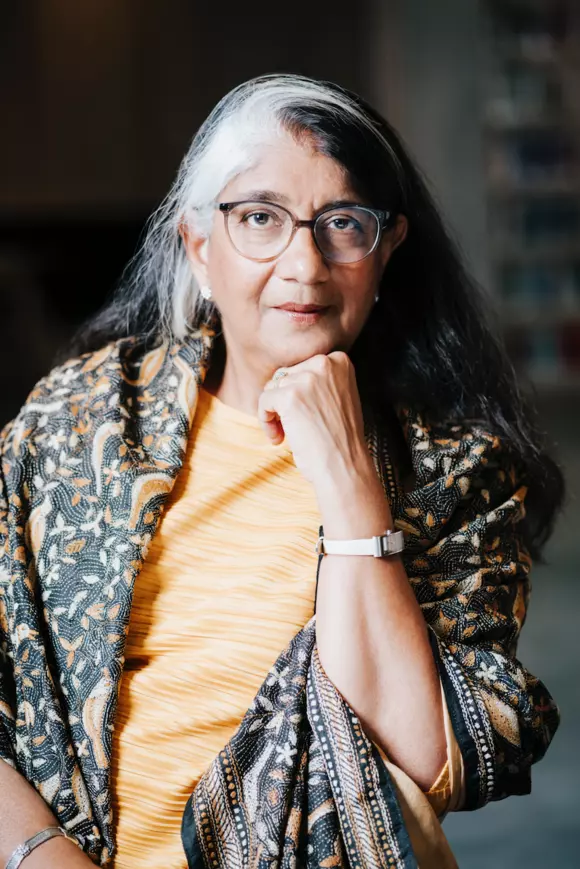Shalini Randeria

Biography
Professor Shalini Randeria is President and Rector of Central European University, the first woman, and the first person from the global South, to take up this position since the University’s founding.
An American-born Indian social anthropologist/sociologist, Randeria has had a distinguished academic career at institutions of higher education across Europe. She served as Rector of the Institute for Human Sciences (IWM) in Vienna and Professor of Social Anthropology and Sociology at the Graduate Institute of International and Development Studies (IHEID) in Geneva, where she was also Director of the Albert Hirschman Centre on Democracy. She holds the Excellence Chair at the University of Bremen, where she leads a research group on “soft authoritarianisms.”
She was educated at the Universities of Delhi, Heidelberg and Oxford, where she belonged to the first cohort of women Rhodes Scholars. Randeria received her PhD and her Habilitation from the Free University of Berlin. She has held faculty positions at the Free University, Berlin; the University of Munich and University of Zurich, where she was Professor of Social Anthropology and Co-Director of the Gender Studies Competence Centre. She was Founding Chair of CEU’s Department of Sociology and Social Anthropology in Budapest.
Currently, in addition to her Distinguished Fellowship at the Munk School, she is Deputy Chair of the Class of Social and Related Sciences, Academia Europaea, and Distinguished Visiting Fellow of IIASA, Laxenburg, Austria. She is Member of the International Advisory Panel on Population and Development, UNFPA EECA group. She has served more recently on the CEU’s Board of Trustees.
Randeria has published widely on the anthropology of globalization, law, the state and social movements. Trained as a sociologist and social anthropologist in Western and non-Western social science traditions, she was exposed to a diversity of disciplinary orientations and theoretical perspectives. Her research on soft authoritarianism; democracy and demography; forced displacement and dispossession; and the politics of (un)accountability has been carried out in collaboration with historians, political scientists and legal scholars. She has led research projects with a comparative perspective on (i) the effects of international investment agreements and arbitration on governance in Argentina, Czech Republic, Mexico, India; (ii) counter-hegemonic globalisation in India, Columbia, Portugal, Mozambique; (iii) the (un)sustainability of changing patterns of food consumption and waste management among middle classes in south and south-east Asia; and most recently (iv) the puzzle of unspent public funds in Italy and India.
Her influential podcast series, Democracy in Question, went into its seventh season in 2023. In a wide-ranging exploration of the diversity of experiences of democracy and the challenges and dilemmas facing liberal democracies around the world today, each episode features Professor Randeria in conversation with a leading scholar. Together they address what needs to be done to ensure the future well-being of our democratic institutions and practices.
Updated July 2023.
Select publications
Brandel, Andrew, Istvan Adorjan and Shalini Randeria, (in press) “Locating the State: Between Region and History”, Annual Review of Anthropology.
Shalini Randeria, ed. (2021) Kapitalismus im 21. Jahrhundert, Passagen Verlag, Wien.
Peschard, Karine and Shalini Randeria, ed. (2020) Special Forum on Seed Activism. Journal of Peasant Studies 47(4).
Randeria, Shalini and Evangelos Karagiannis, (2020) “The migrant position: Dynamics of political and cultural exclusion.” In Theory, Culture & Society 37: 7-8.
Desai, Deval and Shalini Randeria, (2020) “Unfreezing unspent social special-purpose funds for the Covid-19 crisis: Critical reflections from India.” In World Development 136, pp. 1–4.
Desai, Deval, Shalini Randeria, and Christine Lutringer, (2020) “Redefining vulnerability and state-society relationships during the COVID-19 crisis: The politics of social welfare funds in India and Italy.” In Maduro, Miguel Poiares and Paul W. Kahn (ed.), Democracy in Times of Pandemic: Different Futures Imagined, Cambridge, New York: Cambridge University Press, pp. 182–195.
Randeria, Shalini and Björn Wittrock ed. (2019) Social Science at the Crossroads. Leiden, Boston: Brill.
Brandel, Andrew, and Shalini Randeria, (2018) “Anthropological Perspectives on the Limits of the State.” In Draude, Anke, Tanja A. Börzel, and Thomas Risse, ed. In The Oxford Handbook on Governance and Limited Statehood. Oxford/New York: Oxford University Press, pp. 68 -88.
Brandel, Andrew, Veena Das, and Shalini Randeria (2018) “Locations and Locutions: Unravelling the concept of ‘World Anthropology’.” In Laurence Roulleau-Berger and Peilin Li, ed. Post-Western Sociology. From China to Europe. New York: Routledge, pp. 88-105.
Das, Veena, and Shalini Randeria, ed. (2015) Politics of the Urban Poor: Aesthetics, Ethics, Volatility, Precarity. Special issue, Current Anthropology 56 (S11).
Das, Veena, and Shalini Randeria, (2014) “Democratic Strivings, Social Sciences and Public Debates. The Case of India.” In American Anthropologist 116(1), pp. 160-65.
D’Amato, Gianni, Shalini Randeria et. al. (2013), ed. Critical Mobilities. London: Routledge
Dhawan, Nikita and Shalini Randeria, (2013) “Perspectives on Globalization and Subalternity.” In Huggan, Graham, ed. Oxford Handbook of Postcolonial Studies. Oxford: Oxford University Press, pp. 559-586.